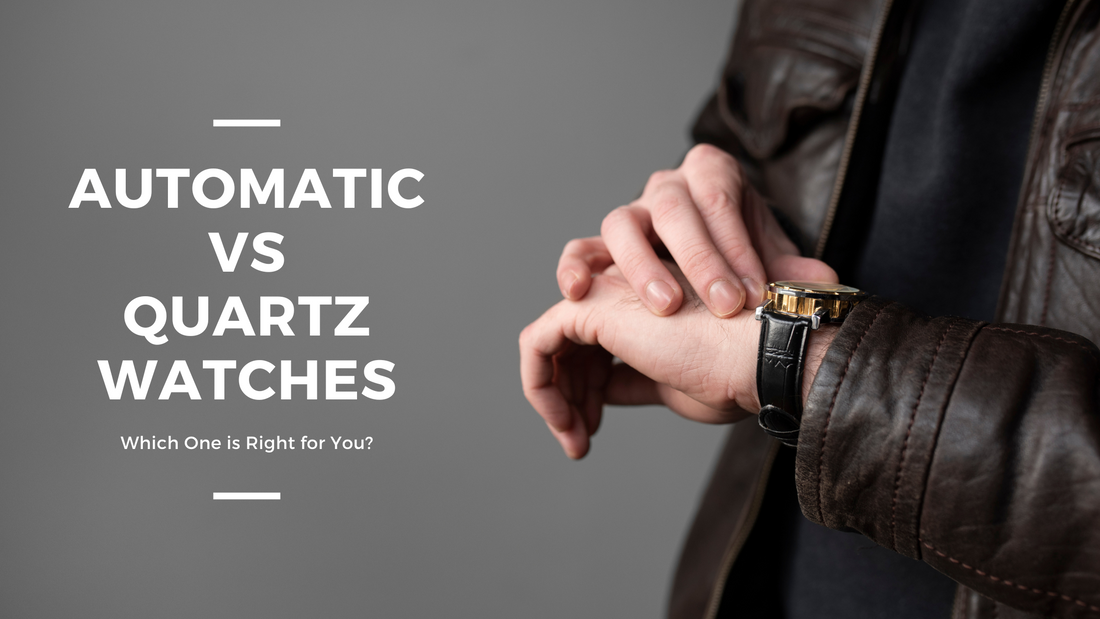
Automatic vs Quartz Watches: Which One is Right for You?
Share
When it comes to selecting the perfect timepiece, two types of watch movements dominate the conversation: automatic and quartz. Both offer distinct benefits, yet their differences reflect more than just mechanics — they represent personal preference, style, and purpose.
In this guide, we’ll explore what sets automatic and quartz watches apart, helping you make an informed decision based on your lifestyle and needs.
What is an Automatic Watch?
An automatic watch is a mechanical watch powered by the motion of the wearer’s wrist. Every time you move, a rotor inside the watch turns, winding the mainspring and keeping the watch running without the need for a battery.
This self-winding mechanism is revered by watch enthusiasts for its craftsmanship and connection to traditional watchmaking. Each movement within an automatic watch is a reminder of the intricate skill involved in creating a piece that doesn’t rely on electrical components.
In short: An automatic watch is a testament to the artistry of horology — designed to last, requiring only the natural motion of the wearer to stay wound.
What is a Quartz Watch?
A quartz watch, in contrast, is powered by a battery and uses a quartz crystal to regulate the time. When electricity passes through the crystal, it vibrates at a precise frequency, ensuring the watch keeps highly accurate time.
Quartz watches are celebrated for their reliability and precision. Their low maintenance makes them a popular choice for those who prefer a no-fuss, accurate timekeeping solution.
In short: A quartz watch offers convenience and dependability, built for everyday use with remarkable accuracy.
Key Differences: Automatic vs Quartz:
In this guide, we’ll explore what sets automatic and quartz watches apart, helping you make an informed decision based on your lifestyle and needs.
What is an Automatic Watch?
An automatic watch is a mechanical watch powered by the motion of the wearer’s wrist. Every time you move, a rotor inside the watch turns, winding the mainspring and keeping the watch running without the need for a battery.
This self-winding mechanism is revered by watch enthusiasts for its craftsmanship and connection to traditional watchmaking. Each movement within an automatic watch is a reminder of the intricate skill involved in creating a piece that doesn’t rely on electrical components.
In short: An automatic watch is a testament to the artistry of horology — designed to last, requiring only the natural motion of the wearer to stay wound.
What is a Quartz Watch?
A quartz watch, in contrast, is powered by a battery and uses a quartz crystal to regulate the time. When electricity passes through the crystal, it vibrates at a precise frequency, ensuring the watch keeps highly accurate time.
Quartz watches are celebrated for their reliability and precision. Their low maintenance makes them a popular choice for those who prefer a no-fuss, accurate timekeeping solution.
In short: A quartz watch offers convenience and dependability, built for everyday use with remarkable accuracy.
Key Differences: Automatic vs Quartz:
| Feature | Automatic Watch | Quartz Watch |
| Power source | Wrist movement | Battery |
| Accuracy | Slight variations may occur | Extremely accurate |
| Maintenance | Requires occasional servicing. Runs for years with daily wear, but servicing costs more. | Battery replacement every 1–2 years |
| Craftsmanship appeal | Traditional artistry | Modern precision |
| Price Range | Generally higher | Wide range, often more affordable |
Pros and Cons:
Automatic Watches - Pros:
• A piece of watchmaking history, often regarded as luxury items
• No need for batteries, self-winding with wear
• Often considered heirloom-worthy due to their craftsmanship
Automatic Watches - Cons:
• Requires regular wearing or manual winding to keep running
• Generally requires servicing to maintain precision over time
Quartz Watches - Pros:
• Highly accurate and low-maintenance
• Lightweight and affordable
• Ideal for everyday wear and functionality
Quartz Watches - Cons:
• Requires battery changes every 1–2 years
• Lacks the traditional craftsmanship of automatic watches
Which One Should You Choose?
Choosing between an automatic and a quartz watch ultimately depends on what you value most.
• If you appreciate the tradition, mechanics, and artistry of a timepiece — an automatic watch is likely the ideal choice for you.
• If you prefer precision, low-maintenance reliability, and a practical solution for daily use — a quartz watch may be the better fit.
Both types of movements offer their unique advantages, and selecting the right one is about finding a balance between style, functionality, and personal preference.
The choice is yours — and it reflects not just your needs but your appreciation for the craft of fine watchmaking.
